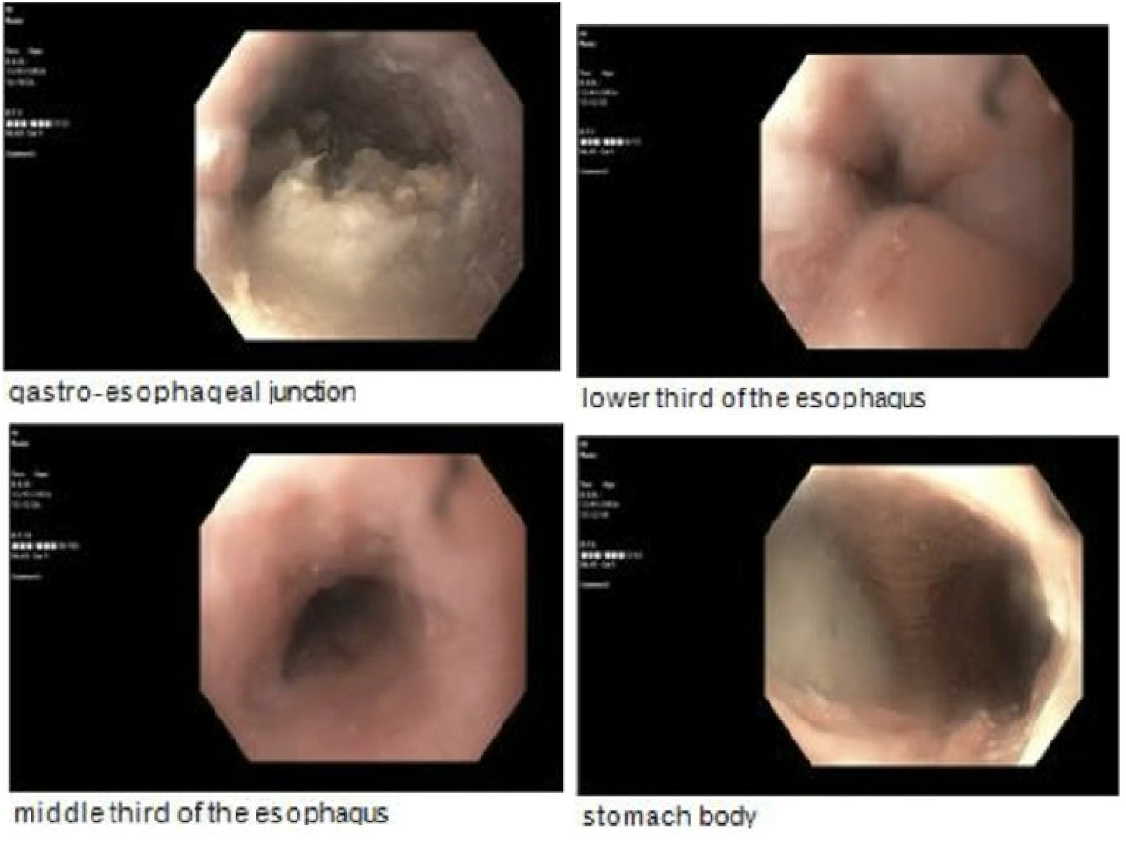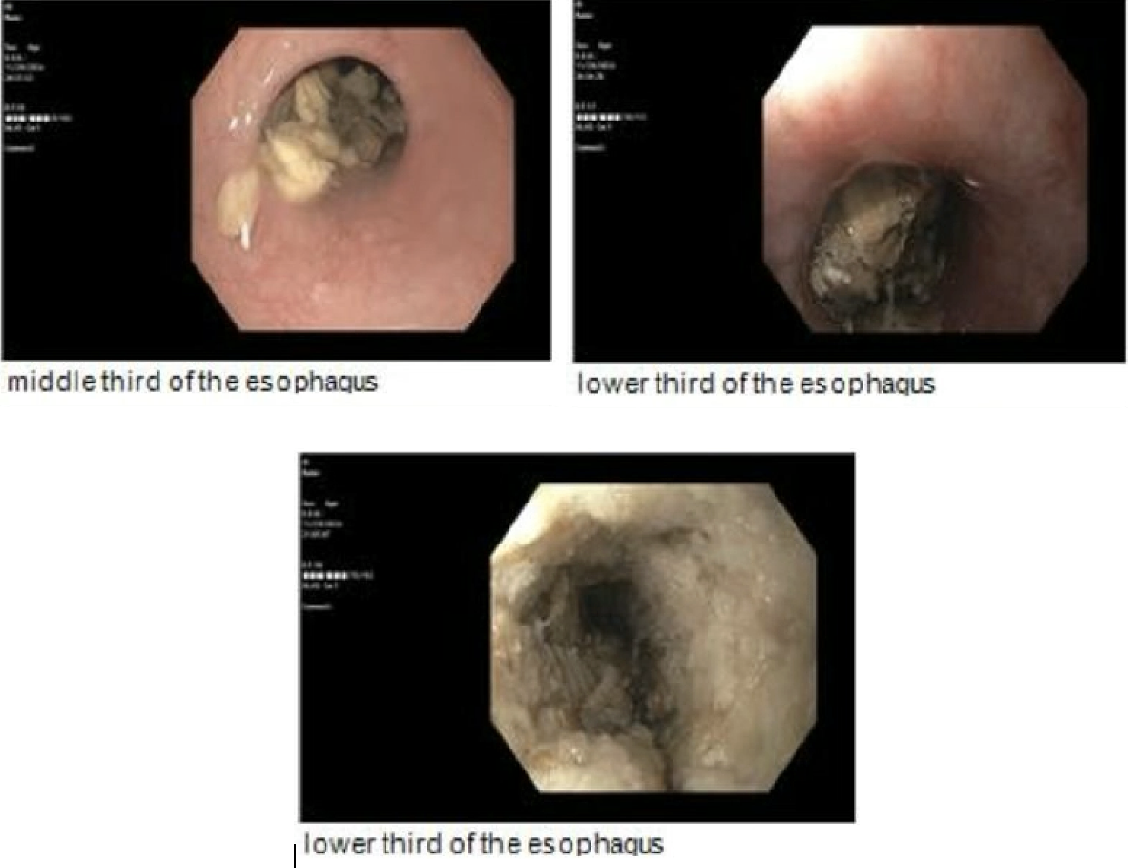Tuesday Poster Session
Category: Esophagus
P4965 - Biting Off More than You Can Chew: A Unique Approach to a Food Bolus
Tuesday, October 28, 2025
10:30 AM - 4:00 PM PDT
Location: Exhibit Hall

Seth Lipshutz, DO (he/him/his)
Jefferson Health
Cherry Hill, NJ
Presenting Author(s)
Seth Lipshutz, DO1, Marisa Pope, DO1, Nikhitha Mantri, MD2
1Jefferson Health, Cherry Hill, NJ; 2Jefferson health, Cherryhill, NJ
Introduction: Food bolus impaction is a common gastrointestinal emergency and ranks as the third most frequent non-biliary GI emergency encountered by gastroenterologists. While most food boluses pass spontaneously, approximately 10–20% require endoscopic intervention using tools such as retrieval nets, snares, grasping forceps, or the push technique. In cases where standard endoscopic methods fail, emerging evidence supports the use of a combination of Coca-Cola and pancrelipase as an effective adjunctive therapy. We present a case of esophageal food bolus impaction refractory to initial endoscopic attempts, which was successfully resolved with Coca-Cola and pancrelipase administration.
Case Description/
Methods: A 77-year-old female presented with a one-week history of progressive dysphagia. Her past medical history included hypertension, hyperlipidemia, and prior carotid endarterectomy. She was hemodynamically stable and protecting her airway but was visibly uncomfortable, vomiting, and unable to tolerate oral intake.
Emergent esophagogastroduodenoscopy (EGD) revealed a large food bolus extending from the mid to lower esophagus, consistent with a food bezoar (Figure A). Multiple attempts at removal using Roth Net, Talon, and Raptor forceps were unsuccessful. The patient was intubated for airway protection and admitted to the ICU. A nasogastric tube was placed, and she received 355 mL of Coca-Cola combined with four opened capsules of pancrelipase, administered in four divided doses over two days. Repeat EGD within 48 hours (Figure B) showed near-complete dissolution of the bolus, with residual material easily cleared with minimal endoscopic manipulation.
Discussion: The mechanism by which Coca-Cola alleviates food bolus impaction is not fully understood. Proposed theories include its acidity dissolving bezoar contents and its ability to lower esophageal sphincter tone, facilitating passage. Pancreatic enzymes like pancrelipase are thought to aid in liquefying food material by inhibiting coagulation, supporting their use in bezoar dissolution.
Growing evidence from case reports supports the efficacy and safety of Coca-Cola with pancrelipase in refractory food bolus cases. Our case adds to the literature by demonstrating successful non-surgical resolution of a significant esophageal impaction, highlighting this combination as a valuable adjunctive treatment when standard endoscopic approaches fail.

Figure: A. Endoscopy prior to treatment with CocaCola and Pancrelipase

Figure: B. Endoscopy after treatment with CocaCola and Pancrelipase
Disclosures:
Seth Lipshutz indicated no relevant financial relationships.
Marisa Pope indicated no relevant financial relationships.
Nikhitha Mantri indicated no relevant financial relationships.
Seth Lipshutz, DO1, Marisa Pope, DO1, Nikhitha Mantri, MD2. P4965 - Biting Off More than You Can Chew: A Unique Approach to a Food Bolus, ACG 2025 Annual Scientific Meeting Abstracts. Phoenix, AZ: American College of Gastroenterology.
1Jefferson Health, Cherry Hill, NJ; 2Jefferson health, Cherryhill, NJ
Introduction: Food bolus impaction is a common gastrointestinal emergency and ranks as the third most frequent non-biliary GI emergency encountered by gastroenterologists. While most food boluses pass spontaneously, approximately 10–20% require endoscopic intervention using tools such as retrieval nets, snares, grasping forceps, or the push technique. In cases where standard endoscopic methods fail, emerging evidence supports the use of a combination of Coca-Cola and pancrelipase as an effective adjunctive therapy. We present a case of esophageal food bolus impaction refractory to initial endoscopic attempts, which was successfully resolved with Coca-Cola and pancrelipase administration.
Case Description/
Methods: A 77-year-old female presented with a one-week history of progressive dysphagia. Her past medical history included hypertension, hyperlipidemia, and prior carotid endarterectomy. She was hemodynamically stable and protecting her airway but was visibly uncomfortable, vomiting, and unable to tolerate oral intake.
Emergent esophagogastroduodenoscopy (EGD) revealed a large food bolus extending from the mid to lower esophagus, consistent with a food bezoar (Figure A). Multiple attempts at removal using Roth Net, Talon, and Raptor forceps were unsuccessful. The patient was intubated for airway protection and admitted to the ICU. A nasogastric tube was placed, and she received 355 mL of Coca-Cola combined with four opened capsules of pancrelipase, administered in four divided doses over two days. Repeat EGD within 48 hours (Figure B) showed near-complete dissolution of the bolus, with residual material easily cleared with minimal endoscopic manipulation.
Discussion: The mechanism by which Coca-Cola alleviates food bolus impaction is not fully understood. Proposed theories include its acidity dissolving bezoar contents and its ability to lower esophageal sphincter tone, facilitating passage. Pancreatic enzymes like pancrelipase are thought to aid in liquefying food material by inhibiting coagulation, supporting their use in bezoar dissolution.
Growing evidence from case reports supports the efficacy and safety of Coca-Cola with pancrelipase in refractory food bolus cases. Our case adds to the literature by demonstrating successful non-surgical resolution of a significant esophageal impaction, highlighting this combination as a valuable adjunctive treatment when standard endoscopic approaches fail.

Figure: A. Endoscopy prior to treatment with CocaCola and Pancrelipase

Figure: B. Endoscopy after treatment with CocaCola and Pancrelipase
Disclosures:
Seth Lipshutz indicated no relevant financial relationships.
Marisa Pope indicated no relevant financial relationships.
Nikhitha Mantri indicated no relevant financial relationships.
Seth Lipshutz, DO1, Marisa Pope, DO1, Nikhitha Mantri, MD2. P4965 - Biting Off More than You Can Chew: A Unique Approach to a Food Bolus, ACG 2025 Annual Scientific Meeting Abstracts. Phoenix, AZ: American College of Gastroenterology.
